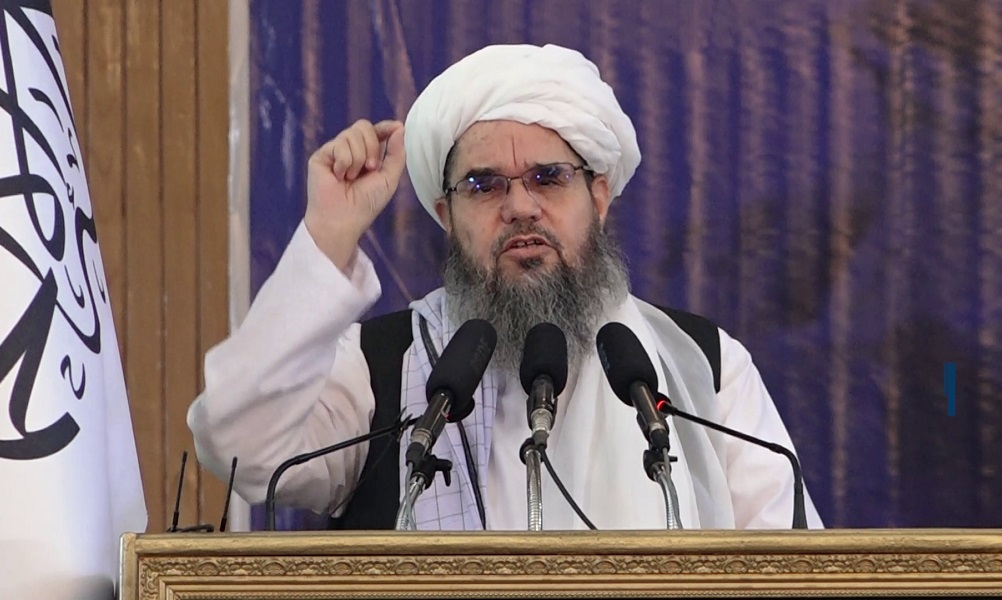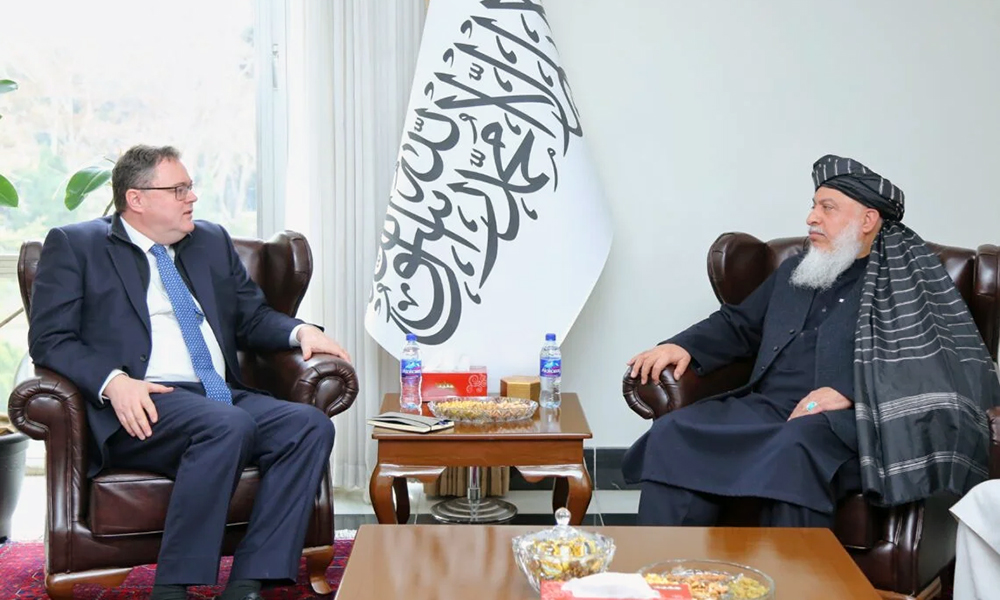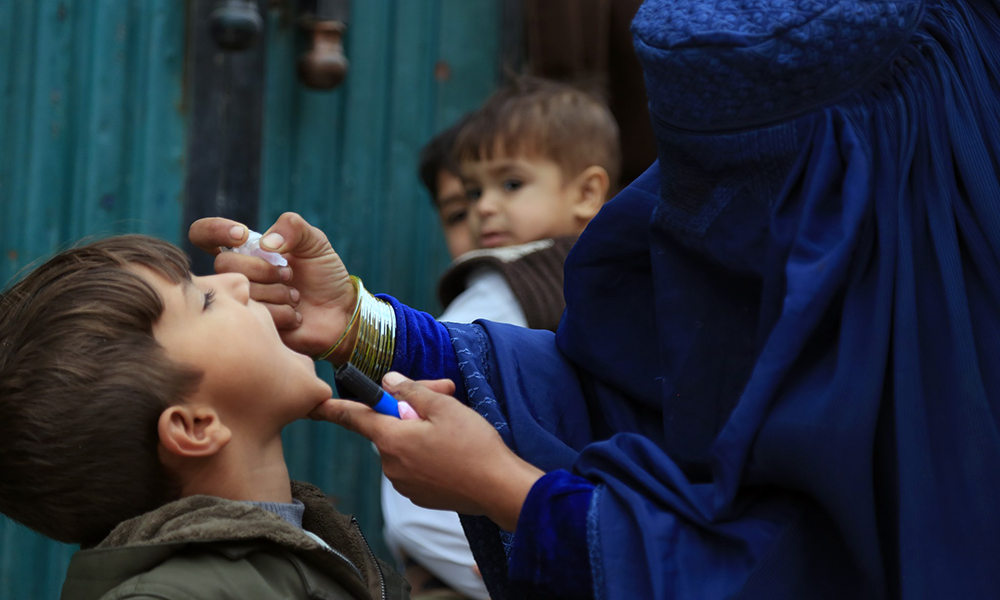Latest News
Protecting the current system is obligatory, like prayer: Dilawar

Acting Minister of Mines and Petroleum Shahabuddin Delawar said at the ceremony commemorating the second anniversary of the Islamic Emirate's takeover of Afghanistan, that protecting the current system is as obligatory as prayer.
"From A to Z, protecting this system is obligatory like prayer. If there is a violation from our side, there will be a heavy punishment, because it is an intrinsic sin,” Dilawar said.
Meanwhile, Deputy Prime Minister for Administrative Affairs Abdul Salam Hanafi recalled that during the 20 years of American forces and its allies’ presence, Afghanistan suffered various crimes and thousands of Afghans were killed.
“What kind of situation prevailed over the Afghan nation here? Thousands of our youths were martyred. Thousands of youths were deprived of their freedom without any kind of trial in different parts of the world,” Hanafi said.
Acting Minister of Information and Culture Khairullah Khairkhah stated that the rule of the Islamic Emirate, in addition to preventing the country's disintegration, put an end to the 20-year presence of America, corruption and islands of power in Afghanistan.
"Our homeland was saved from misery, it was saved from divisions, it was saved from ethnic, linguistic and regional discrimination. We have received many benefits. May Allah make it possible for us to be thankful for it. There is still a lot of work left,” Kairkhah said.
Acting Minister of Foreign Affairs Amir Khan Muttaqi also said that despite the propaganda against the government, the Islamic system is still in place. He claimed that the economic situation in the country is improving day by day.
“During the last 20 years, we resisted physically, no one complained, if they would be martyred and injured and their houses would be destroyed, they would not complain to anyone except Almighty Allah. In the last two years, when there was an attempt to make trouble, we didn't complain to anyone and we didn't ask anyone for help. Alhamdulillah, all opponents were removed, security has been ensured, the system is in place, economy is developing day by day,” Muttaqi said.
A number of other officials of the Islamic Emirate also said at the ceremony that the Islamic Emirate has laid the foundation for a movement that will lead Afghanistan to permanent peace and stability, control of crises and a better future.
According to them, no power will be able to create a gap between the people and the government.
"Without stability, progress and development in the country is not possible. First, there should be stability so that development is facilitated,” Madar Ali Karimi Bamiani, Deputy Minister of Urban Development and Housing, said.
"No power can create a gap between the people and the system. This system won with the sacrifice of the Afghan people, and with the support of the Afghan people, it will be permanent, strong, stable and dynamic,” Abdul Latif Nazari, deputy minister of economy, said.
Latest News
Norwegian Chargé d’Affaires meets with IEA deputy foreign minister
Welcoming the diplomat’s visit to Kabul, Stanikzai underscored the importance of political relations between Afghanistan and Norway, the foreign ministry said in a statement.

The Norwegian Chargé d’Affaires for Afghanistan, Per Albert Ilsaas, on Saturday met with IEA’s Deputy Foreign Minister for Political Affairs, Sher Muhammad Abbas Stanikzai, in Kabul.
Welcoming the diplomat’s visit to Kabul, Stanikzai underscored the importance of political relations between Afghanistan and Norway, the foreign ministry said in a statement.
In addition to focusing on bilateral political, humanitarian, and other pertinent issues, the two sides expressed hope that continued engagement would lead to constructive solutions to related issues.
This comes two weeks after the Foreign Ministry Spokesman Abdul Qahar Balkhi expressed disappointment regarding the decision by the Norwegian government to downgrade diplomatic relations with Afghanistan.
Balkhi said in a post on X that such decisions should not be linked with internal affairs of other countries.
“Diplomatic engagement is most effective when it fosters mutual understanding and respect, even amidst differing viewpoints,” he stated.
“Access to consular services is a fundamental right of all nationals. We strongly urge all parties to prioritize this principle in the spirit of international cooperation,” he added.
Latest News
A new polio vaccination campaign is set to launch in Afghanistan
Afghanistan and Pakistan are the only two countries in the world where polio has not been eradicated.

The “Afghanistan Polio-Free” organization announced that a new round of polio vaccinations will begin on Monday, December 23, in various provinces of Afghanistan.
The organization did not specify which provinces will be targeted or how long the vaccination campaign will last.
Afghanistan and Pakistan are the only two countries in the world where polio has not been eradicated.
On December 4, 2023, the World Health Organization (WHO) issued a statement reporting a 283% increase in polio cases in Afghanistan. According to the WHO, the number of positive environmental samples for wild poliovirus type 1 in Afghanistan in 2024 reached 84, compared to 62 cases in 2023.
The Ministry of Public Health claimed in November 2024 that no new cases of polio had been reported in Afghanistan for the year.
Latest News
G7 envoys urge national dialogue for lasting stability in Afghanistan

Special Representatives of the Group of Seven (G7), including the European Union, have emphasized the importance of a national dialogue for achieving long-term stability in Afghanistan.
Following a meeting on Afghanistan in Geneva, Switzerland, G7 special envoys issued a joint statement calling for the restoration of women's rights and urging the Islamic Emirate to fight terrorism.
The statement reads: "Achieving sustainable peace and stability requires credible governance that represents all segments of Afghan society."
The representatives also expressed concern over the IEA’s decision to ban girls from attending medical institutes, warning that it will have devastating consequences for the citizens, particularly mothers and their infants.
The statement described this ban as unacceptable and called on the Afghan authorities to lift it immediately.
Earlier, countries and international organizations had called for the removal of restrictions on the education and employment of women and girls, emphasizing the need for a national dialogue.
In response to these concerns, IEA has repeatedly stated that it will not allow interference in the internal affairs of the country.
The G7 special envoys also expressed their concern about the recent terrorist attacks in Kabul and the surrounding region, warning that terrorism remains a serious threat to Afghanistan's security. They confirmed the actions of the IEA against Daesh but stressed the need for more decisive measures.
-

 Sport5 days ago
Sport5 days agoLanka T10: All three matches abandoned due to rain
-

 Latest News5 days ago
Latest News5 days agoIndia hoping to import coal and marble from Afghanistan
-

 Sport4 days ago
Sport4 days agoZimbabwe’s opening ODI against Afghanistan abandoned
-

 Latest News5 days ago
Latest News5 days agoJapan announces $27.5 million aid package to Afghanistan
-

 Latest News1 day ago
Latest News1 day agoAfghan men must stand with women to support viable future of country: US envoy
-

 World3 days ago
World3 days agoNorth Korean troops suffer 100 deaths, struggling in drone warfare, South Korea says
-

 Latest News3 days ago
Latest News3 days agoTwo horror accidents on Kabul-Kandahar highway leave 52 dead
-

 International Sports4 days ago
International Sports4 days agoLanka T10: Kandy Bolts in at 4th spot in playoffs after thrilling day
























